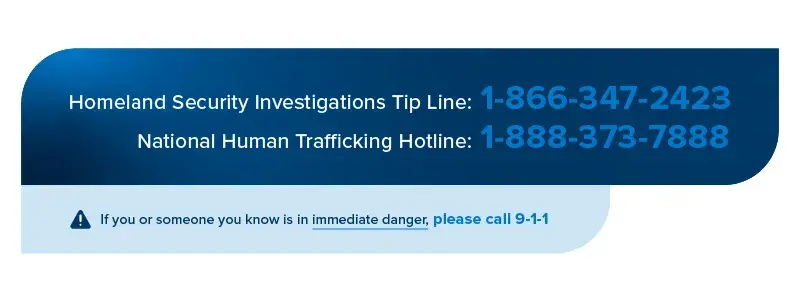
By identifying and reporting suspected human trafficking, you are doing your part to help law enforcement recover victims.
Law enforcement can connect survivors of human trafficking to services such as medical and mental health care, shelters, job training, and legal assistance that restore their freedom and dignity. The public’s vigilance to report human trafficking is a vital line of defense against this heinous crime.
What to Report:
- WHO you saw.
- WHAT you saw.
- WHEN you saw it.
- WHERE it occurred.
- WHY it is suspicious.
Remember: No tip is insignificant. If a situation gives you pause, trust your instincts. The presence or absence of any of the indicators is not necessarily proof of human trafficking. It is up to law enforcement to investigate suspected cases and make the determination. Factors such as race, ethnicity, gender, and/or religious affiliation are not indicators of suspicious behavior.
Do not at any time attempt to confront a suspected trafficker directly or alert a victim to your suspicions.
Your safety as well as the individual’s safety is paramount. Instead, please contact local law enforcement directly or call the tip lines indicated on this page.
If you believe the situation is an emergency or that someone is in immediate danger, call 9-1-1.
- Call 1-866-347-2423
- The Homeland Security Investigations (HSI) Tip Line runs 24 hours a day, 7 days a week, every day of the year.
- This Tip Line staffs highly trained specialists to take reports from both the public and law enforcement agencies on more than 400 laws enforced by HSI, including those related to human trafficking.
- The Tip Line is accessible outside the United States by calling 802-872-6199.
- Call 1-888-373-7888 or Text HELP or INFO to BeFree (233733).
- The NHTH can help connect victims and survivors with service providers in the area and provides training, technical assistance, and other resources.
- The NHTH is a national, toll-free hotline available to answer calls from anywhere in the country, 24 hours a day, 7 days a week, every day of the year.
- The NHTH is not a law enforcement or immigration authority and is operated by a nongovernmental organization funded by the Federal government.
- Learn the Signs of Human Trafficking
- Recognizing key indicators of human trafficking is the first step in identifying victims and can help save a life. Learn how to spot the signs.
- Blue Campaign Indicator Cards
- Download or order the Blue Campaign Indicator Cards in over 30 languages.
Not all indicators are present in every human trafficking situation, and the presence or absence of any of the indicators is not necessarily proof of human trafficking.
- Blue Campaign Training
- Blue Campaign provides over 10 training resources for everyone from first responders to convenience retail workers and campus law enforcement. The training courses are free and available to the public.
- Blue Campaign Toolkits and Guides
- Blue Campaign developed toolkits for various communities to raise awareness of human trafficking. These toolkits provide an overview of human trafficking, how it affects the community, and information to recognize and report suspected incidents.
- Request Blue Campaign Materials
- Blue Campaign provides a wide variety of free human trafficking awareness materials to help educate the public to recognize indicators of trafficking and report suspected incidents to law enforcement.
- To request materials, complete the form located at the link below. Additional materials are also available for download in the Blue Campaign Document Library.
About Blue Campaign
Blue Campaign is a national public awareness campaign designed to educate the public, law enforcement, and industry partners to recognize the indicators of human trafficking and respond appropriately. Learn more about how you can help.
To report suspected human trafficking to federal law enforcement, call 1-866-347-2423. If you are a victim of trafficking and need help, call the National Human Trafficking Hotline (NHTH) at 1-888-373-7888 or text HELP or INFO to BeFree (233733).
Important: Do not attempt to confront a suspected trafficker directly or alert a potential victim to your suspicions. Your safety as well as the victim's safety is paramount. Instead, please contact local law enforcement (9-1-1) directly or call the tip lines.


